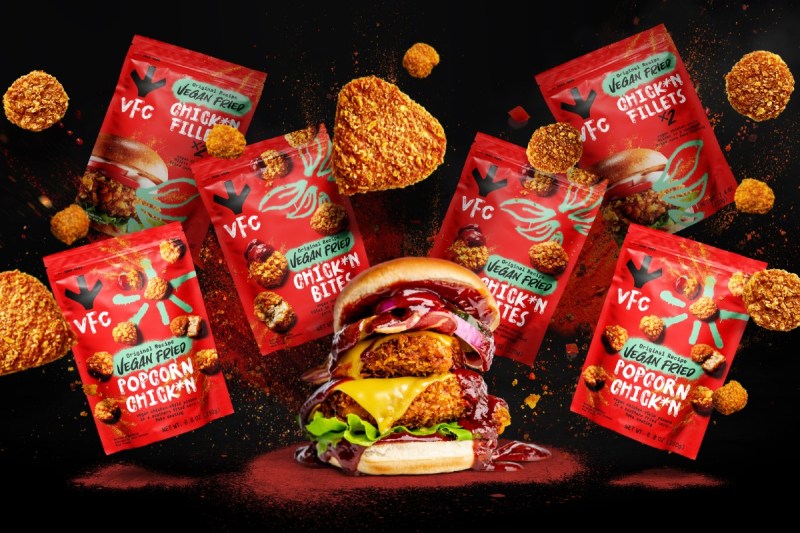VFC, aka Vegan Fried Chick*n, began like all good inventions — by accident and intuition.
When the pandemic hit two and half years ago, restaurants in York, England, were shut down and co-founder Matthew Glover found himself without prized vegan fried chicken and chips (fries). Not one to sit down without his favorite food, the entrepreneur got to know restaurant owners, which included chef and restaurateur Adam Lyons. Lyons eventually shipped a frozen care box to Glover, who shared the plant-based chicken, chips, coleslaw, and barbecue sauce with friends and family — and it was a hit.

“I picked up the phone, and [called Adam], and said, ‘I think we need to talk,’” Glover said.
Several months later, in December 2020, the pair co-founded VFC, launching a direct-to-consumer product. Their goal is not to target eateries, but retail and food service on a large scale. With a “fair bit” of traction now in the UK (with listings at two of the isle’s two biggest retailers), Lyons and Glover have turned their attention to the U.S. marketplace. They’re currently in conversations with large U.S. grocery retailers, which means VFC could soon be available near you — a tasty, ethically sourced alternative to processed chicken patties and nuggets.
The brains behind VFC have their plant-based comfort food ready to take on the United States marketplace with the tagline, ‘Thanks Colonel we’ll take it from here.”
“The U.S. gave the world KFC, and we want to give VFC back. We want to be like The Beatles and the Stones and bring this food across the pond,” Glover said.
Why You Should Care About Vegan Chicken
VFC chicken products are marketed as grocery staples similar in taste and package to typical frozen meat products, but with a very different mission than Tyson or Eckrich Farms. For VFC, this is a “rebellion against a system that has brought us climate change, environmental destruction, factory farming, and slaughterhouses.”
In addition to profits, the team, knowing the many benefits of going vegan, is driven by a higher purpose of uplifting the vegan space. Glover’s endeavors to elevate non-meat foods include founding Veganuary with his wife, Jane Land. The campaign asks that consumers commit to eating plant-based foods for the month of January — an opportune time after the New Year when everyone is looking to eat healthier. Since launching in 2014, an estimated two million people across 220-plus countries and territories have taken the pledge. It was a cold January, in fact, when Glover was first missing his beloved vegan patty.
The founder also established Veg Capital “to provide early-stage investment to companies developing vegan meat, dairy, eggs, and seafood replacements,” which VFC fits to a T. The company aims to deliver via attitude and flavor, rejecting the status quo to spark a positive food revolution that celebrates delicious and feel-good vegan foods. Instead of going after a niche, VFC is aiming to bring together vegans and meat eaters with tasty meat alternatives that challenge the entire meat industry. This begins with packaging.
“As for packaging, I said I don’t care what color it is as long as it’s red,” Glover said. “Other vegan brands are green and brown, presented as wholesome and hippyish. We wanted to create something that really popped.”
Does Plant-Based Chicken Actually Taste Good?
The key to success, however, is the product. Without quality goods, all the marketing efforts in the world aren’t going to save it. Toward that end, VFC reports very positive reactions to their chicken alternative.
“At Expo West (natural food convention), Vegetable News, a vegan news platform, tried all different chicken brands, and VFC came up number one for taste profile and texture against established players like MorningStar and Beyond Chicken,” Glover said.
“I hear a lot of comments about the crunchiness of it,” VFC general manager Craig Bowlin said. “Many people walked away mesmerized. They’d take a sample, bite it and turn back around, say, ‘Holy (crap) that’s good.”

VFC’s Vegan Chicken Is Not Just For Vegans
VFC does not describe its product as a diet food. The purpose is to compete on taste and convince all styles of eaters that VFC is a worthy meat substitute.
“This isn’t health food,” co-founder Matthew Glover said. “It’s something that you’ll eat while watching football or sports on TV. We’re competing with burgers, sausages, and other meats.”
The wheat and soy product will, of course, be more healthy for circulatory systems than heavy meats and provide less of a natural impact. Anyone who wants to argue with “the world’s most rebellious and innovative vegan food company” is welcome to.
“We take the mickey out of our trolls,” Glover said. “Ten years of being vegan, and you get used to the same old comments you need to debunk. ‘You can’t call it chicken,’ or ‘I’d rather get a wasp stuck up my bum than eat that.’ We try to be funny in our response to these people.”
Glover credits his wife Jane Land for much of the troll-slaying, wielding nonjudgmental British sarcasm like an online knight battling monsters below a bridge. This back and forth has led to an incredible 6% engagement across social media channels, building the new firm a loyal base of customers.
“It’s so unique to the category — the tone of voice, packaging, and fun conversation. To have that with a retailer is so different, and people appreciate that,” Bowlin said.
Since its founding, the brand has spared more than 142,000 UK chickens and has gone undercover to expose the dire standards of KFC’s factory farming, the story which broke on The Guardian.



